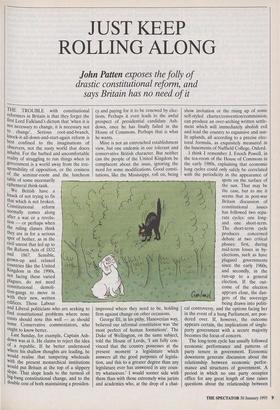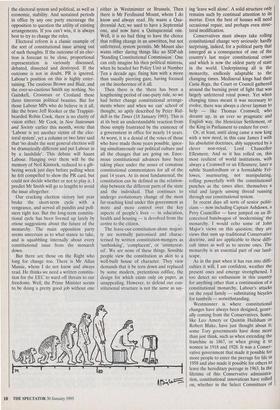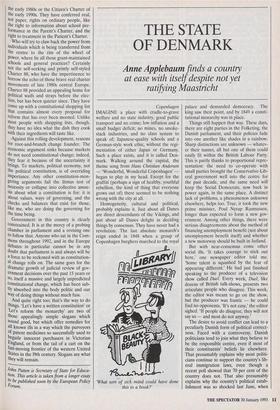JUST KEEP ROLLING ALONG
John Patten exposes the folly of
drastic constitutional reform, and says Britain has no need of it
THE TROUBLE with constitutional reformers in Britain is that they forget the first Lord Falkland's dictum that 'when it is not necessary to change, it is necessary not to change'. Serious root-and-branch, knock-it-all-down-and-start-again reform is best confined to the imaginations of observers, not the nasty world that doers inhabit. For the barbed and uncomfortable reality of struggling to run things when in government is a world away from the irre- sponsibility of opposition, or the cosiness of the seminar-room and the luncheon table of some necessarily ephemeral think-tank.
We British have a knack of not trying to fix that which is not broken.
Last Sunday, for example, Captain Ash- down was at it. He claims to reject the idea of a republic. If he better understood where his shallow thoughts are leading, he would realise that tampering wholesale with the present monarchical institutions would put Britain at the top of a slippery slope. That slope leads to the turmoil of big-bang constitutional change, and to the double cost of both maintaining a presiden- cy and paying for it to be renewed by elec- tions. Perhaps it even leads to the awful prospect of presidential candidate Ash- down, once he has finally failed in the House of Commons. Perhaps that is what he wants.
Mine is not an entrenched establishment view, but one endemic in our tolerant and conservative British character. But neither can the people of the United Kingdom be complacent about the issue, ignoring the need for some modifications. Good consti- tutions, like the Mississippi, roll on, being improved where they need to be, holding firm against change on other occasions. George III, in his pithy, Hanoverian way, believed our informal constitution was 'the most perfect of human formations'. The Duke of Wellington, on the same subject, told the House of Lords, 'I am fully con- vinced that the country possesses at the present moment a legislature which answers all the good purposes of legisla- tion, and this to a greater degree than any legislature ever has answered in any coun- try whatsoever.' I would sooner side with them than with those extremely wise jurists and academics who, at the drop of a chat- show invitation or the rising up of some self-styled charter/convention/commission, can produce an over-arching written settle- ment which will immediately abolish evil and lead the country to expansive and sun- lit uplands, all according to a precise elec- toral formula, as exquisitely measured in the basements of Nuffield College, Oxford.
I think I remember J. Enoch Powell, in the tea-room of the House of Commons in the early 1980s, explaining that economic long cycles could only safely be correlated with the periodicity in the appearance of spots on the surface of the sun. That may be the case, but to me it seems that in post-war Britain discussion of The long-term cycle has usually followed economic performance and patterns of party tenure in government. Economic downturns generate discussion about the relationship between economic perfor- mance and structures of government. A period in which no one party occupies office for any great length of time raises questions about the relationship between the electoral system and political, as well as economic, stability. And sustained periods in office by any one party encourage the opposition to question the utility of existing arrangements. If you can't win, it is always best to try to change the rules.
Electoral reform is a classic example of the sort of constitutional issue arising out of such thoughts. If the outcome of an elec- tion is forecast to be close, proportional representation is variously discussed, debated, dissected and destroyed. If the outcome is not in doubt, PR is ignored. Labour's position on this is highly enter- taining. The cautious Brown and Blair, and the ever-so-cautious Smith say nothing. No Gaitskell, Crossman or Crosland these three timorous political beasties. But for those Labour MPs who do believe in it all, like the brave Jeff Rooker or the Trappist- bearded Robin Cook, there is no clarity of vision either. Mr Cook, in New Statesman and Society earlier this month, wrote that `Labour is yet another victim of the elec- toral system', yet a column or two later said that `no doubt the next general election will be dramatically different and put Labour in by a landslide'. This debate will haunt Labour. Hanging over them will be the memory of Neil Kinnock, reduced to a gib- bering wreck just days before polling when he felt compelled to show the PR card, but could not decide whether or not to play it. I predict Mr Smith will go to lengths to avoid the issue altogether.
Our cracking election victory last year broke the short-term cycle with a vengeance, and served all pundits and poll- sters right too. But the long-term constitu- tional cycle has been livened up lately by otiose suggestions about the future of the monarchy. The main opposition party seems uncertain as to what stance to take, and is squabbling internally about every constitutional issue from the monarch down.
But there are those on the Right who long for change too. There is Mr Allan Massie, whom I do not know and always read. He thinks we need a written constitu- tion for the EEC to ward off threats to our freedoms. Well, the Prime Minister seems to. be doing a pretty good job without one either in Westminster or Brussels. Then there is Mr Ferdinand Mount, whom I do know and always read. He wants a Qua- drennial Act; we used to have a Septennial one, and now have a Quinquennial one. Well, it is no bad thing to have the choice that rolling change in an unwritten, but not unfettered, system permits. Mr Mount also wants other daring things like an SDP-ish `Standing Constitutional Commission'. One can only imagine his then political mistress, when he headed her Policy Unit at Number Ten a decade ago, fixing him with a more than usually piercing gaze, having focused on the incoherence of it all.
Then there is the 'there has been a lengthening period of one-party rule, so we had better change constitutional arrange- ments where and when we can' school of thought, so aptly described by Peter Rid- dell in the Times (18 January 1993). This is at its best an understandable reaction from those simply frustrated by the existence of a government in office for nearly 14 years. At worst, it is a denial of the votes of those who have made those years possible, ignor- ing simultaneously our political culture and all the changes that are going on. Enor- mous constitutional advances have been taking place under the noses of comatose constitutional commentators for all of the past 14 years. At its most fundamental, the constitution can be defined as the relation- ship between the different parts of the state and the individual. That continues to undergo evolutionary change of the most far-reaching kind under this government as more and more control over the key aspects of people's lives — in education, health and housing — is devolved from the centre to the citizen.
The leave-our-constitution-alone majori- ty are normally patronised and charac- terised by written constitution-mongers as `unthinking', 'complacent', or 'uninterest- ed'. We are none of these things. Sensible people view the constitution as akin to a well-built house of character. They view demands that it be torn down and replaced by some modern, pretentious edifice, the design for which exists only on paper, as unappealing. However, to defend our con- stitutional structure is not the same as say-
ing 'leave well alone'. A solid structure only remains such by continual attention to its mortar. Even the best of houses will need occasional repair, and perhaps even struc- tural modification.
Conservatives must always take rolling constitutional change very seriously: hardly surprising, indeed, for a political party that emerged as a consequence of one of the country's last major constitutional crises and which is now the oldest party of state in the world. Underpinning all is the monarchy, endlessly adaptable to the changing times. Mediaeval kings had their Curia Regis, the Court or Council gathered around the burning point of light that was largely unfettered royal power. Yet when changing times meant it was necessary to evolve, there was always a clever layman to help — like Thomas Cromwell, who dreamt up, in an ever so pragmatic and English way, the Henrician Settlement, or the King in Parliament to endure for ever.
Or, at least, until along came a new king with a new need, in this case James I with his absolutist doctrines, ably supported by a clever non-royal, Lord Chancellor Ellesmere. And so it has rolled on, this most resilient of world institutions, with always a Cromwell or an Ellesmere, later a subtle Stamfordham or a formidable Fel- lowes, murmuring, not manipulating, rolling powerfully with the constitutional punches as the times alter, themselves a vital and largely unsung thread running through our constitutional system.
In recent days all sorts of senior politi- cians — now including Captain Ashdown, a Privy Councillor — have jumped on an ill- conceived bandwagon of 'modernising' the monarchy. I would echo some of John Major's views on this question; they are views that sum up traditional Conservative doctrine, and are applicable to these diffi- cult times as well as to serene ones. The monarchy is an essential part of our land- scape.
As in the past when it has run into diffi- culties it will, I am confident, weather the present ones and emerge strengthened. I too detect no enthusiasm in this country for anything other than a continuation of a constitutional monarchy, Labour's attacks on the royal family — substituting bicycles for tumbrils — notwithstanding.
Westminster is where constitutional changes have always been designed, gener- ally coming from the Conservatives. Some, like Leo Amery or Quintin Hailsham or Robert Blake, have just thought about it; some Tory governments have done more than just think, such as when extending the franchise in 1867, or when giving it to women in 1918 and 1928. It was a Conser- vative government that made it possible for more people to enter the peerage for life in 1958 and also made it possible for others to leave the hereditary peerage in 1963. In the lifetime of this Conservative administra- tion, constitutional innovations have rolled on, whether in the Select Committees of
the early 1980s or the Citizen's Charter of the early 1990s. They have conferred real, not paper, rights on ordinary people, like the right to information about school per- formance in the Parent's Charter, and the right to treatment in the Patient's Charter.
Who will try to claw back the power from individuals which is being transferred from the centre to the rim of the wheel of Power, where lie all those grant-maintained schools and general practices? Certainly not the self-seeking and primly self-styled Charter 88, who have the impertinence to borrow the echo of those brave real charter movements of late 1980s central Europe. Charter 88 provided an appealing home for political waifs and strays before the elec- tion, but has been quieter since. They have come up with a constitutional shopping list that contains almost every proposal for reform that has ever been mooted. Unlike most people with shopping lists, though, they have no idea what the dish they cook with their ingredients will taste like.
Against this rolling development, reasons for root-and-branch change founder. The economic argument sinks because markets do not need constitutional change; indeed, they fear it because of the uncertainty it brings. To markets, political economy, not the political constitution, is of overriding importance. Any other constitution-mon- gering arguments fail the litmus test of necessity or collapse into collective amne- sia about what a constitution is for: it is about values, ways of governing, and the checks and balances that exist for those, like me, who are doing the governing for the time being.
Government in this country is clearly constrained. It is at the mercy of a probing chamber in parliament and a revising one to follow that. Anyone who sat in the Com- mons throughout 1992, and in the Europe debates in particular cannot be in any doubt that parliament is and always will be a force to be reckoned with as constitution- al change rolls on. The same goes for the dramatic growth of judicial review of gov- ernment decisions over the past 15 years or so, itself a massive and largely unpredicted constitutional change, which has been sub- tly absorbed into the body politic and our way of doing things without much fuss.
And quite right too; that's the way to do things. 'Let's have a written constitution' or Let's reform the monarchy' are two of those appealingly simple slogans which sound good, but which offer remedies for all known ills in a way which the purveyors of patent medicines so successfully used to beguile innocent purchasers in Victorian England, or from the tail of a cart on the fast-moving frontier of the western United States in the 19th century. Slogans are what they will remain.
John Patten is Secretary of State for Educa- tion. This article is taken from a longer essay to be published soon by the European Policy Forum.












































































 Previous page
Previous page